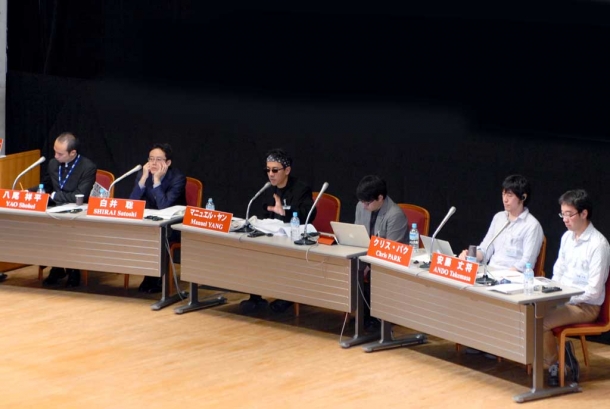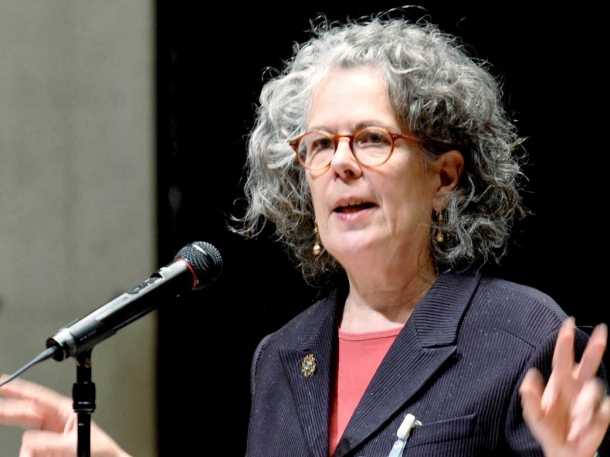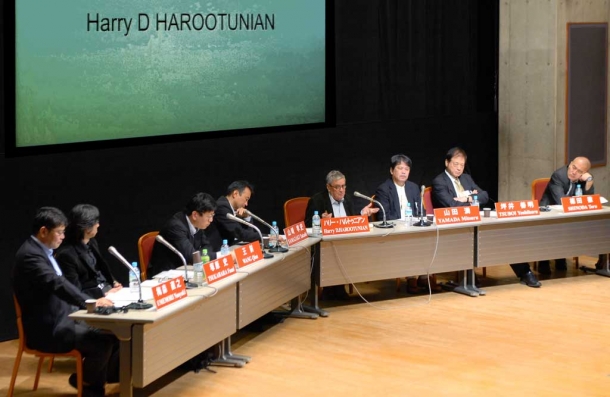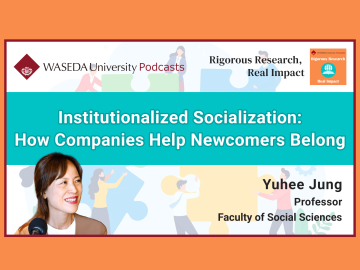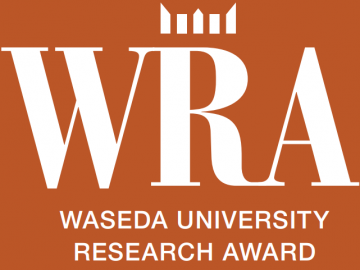The Organization for Asian Studies held its 12th international symposium at the Masaru Ibuka Auditorium in the International Conference Center on November 8th, 2014. The symposium, titled “Re-thinking 1968 from East Asia,” was attended by keynote speaker, Professor Kristin Ross (New York University) and commentator, Professor Harry Harootunian (Columbia University). More than 10 researchers in history, political science, area studies, and literature shared personal experiences and discussed the social implications of 1968, a year of global insurrection against post-war regimes. This symposium was hosted jointly by the Research Institute for Letters, Arts and Sciences, the Waseda University Organization for Japan-US Studies, the Organization for European Studies, and the Ministry of Education (MEXT). The symposium was part of the MEXT-supported program for the Private University Strategic Research Foundation titled “Contemporary Japanese Humanities and East Asia: Risks and Opportunities for the Humanities in East Asia.”
Professor Chelsea Szendi Schieder, special-appointed assistant professor of Meiji University, served as moderator of the symposium. Director of Waseda University’s Organization for Asian Studies, Professor Hikota Koguchi (Faculty of Law), gave the following opening address. “In 1968, I was in my third year at law school. Although there were feelings of protest against university authorities, we did not understand the location and characteristics of the true authorities of Japanese society. Unlike in China where the power structure could be identified, Japan’s was not visible. I would like to examine the consequences of this characteristic and how it affects Japanese society today.”
In the first session moderated by Shohei Yao (Organization for Asian Studies), Professor Satoshi Shirai (Bunka Gakuen University), and Professor Manuel Yang, Professor Shirai emphasized a common thread that ran through the social and political activities of the time – the question of how to accept defeat in a post-war era run by a conservative regime that ‘denied’ defeat. He pointed out the distorted “homeland war (本土決戦)” motif which gained popularity during the protests against the Security Treaty around 1968. Professor Yang commented on the intellectual discussions of the time by examining two writers, Takaaki Yoshimoto and E.P. Thompson. He compared Yoshimoto’s ‘Treatise on shared fantasies,’ which states that ideologies that encompass time and death are found in ancient and contemporary society, with Thomson’s ‘Time, Work-Discipline, and Industrial Capitalism,’ which states that the abstract notion of time was normalized as a means of exploitation during the rise of industrial capitalism. Following these comments, Arata Hirai (Graduate School of Political Sciences) spoke about the history of the democracy movement and the Sunflower Movement in Taiwan and Chris Park discussed the significance of 1968 for South Korea. Professor Takemasa (Musashi University) expressed his hopes regarding the post-modern, pro-democracy movement in Hong Kong.
In the afternoon session, Professor Kristin Ross delivered a keynote speech on “1968 and the Contingency of Power” and explained what led her to work on ‘May ‘68 and Its Afterlives’. Professor Ross examined how the events of 1968 are depicted by institutions such as the media and discussed the implications of historicizing political outcomes. She questioned what kind of effect depictions of 1968 have on the present day and emphasized the importance of a comparative-historical viewpoint that interprets national events as global events. Professor Ross states that this viewpoint allows individuals to understand the effects of events such as those of 1968 in regards to individual, personal experiences.
In the second session moderated by Professor Naoyuki Umemori (Faculty of Political Science and Economics), Professor Tsukahara shared personal experiences of 1968 and discussed the impact that Takaaki Yoshimoto and Baudrillard had on him. In a report titled “Re-thinking the Cultural Revolution,” Professor Wang Qian discussed the “new enlightenment movement” and its demise following the Cultural Revolution, as well as the Chongqing incident. Professor Yamazaki discussed the Koza Riot of 1970 within the conceptual context of Anthony Giddens’ work. Professor Toru Shinoda of the Faculty of Social Sciences, who took the stage as a commentator, described his early childhood and the shock that people experienced when newspapers reported the bombing halt in Vietnam. He also discussed the publication, ‘Thoughts on Modern Revolutions’ by Chikuma Shobo.
The speakers of the second session were Professor Mitsuru Yamada (Faculty of Social Sciences) and Professor Yoshiharu Tsuboi (School of Political Science and Economics). Professor Yamada explained that 1965 was a historically important year where first generation post-revolution leaders transitioned into economic growth-oriented authoritarian systems. Professor Tsuboi described how his exposure to anti-Vietnam war movements at Tokyo University in 1968 was the starting point for his interest in the everyday lives of Vietnamese people and his research into Vietnam.
Professor Harootunian criticized the isolationist tendencies seen in Japanese historical research and emphasized the need to look at local phenomena within the context of global events. He also stressed the importance of examining the political and historical attitudes that influence the majority of the population rather than focusing on the ideas of a few intellectual thinkers.
This symposium is set to be featured in the next edition of Waseda Asia Review (published by the Organization for Asian Studies)

